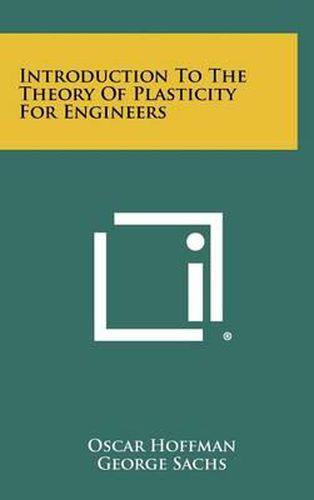Readings Newsletter
Become a Readings Member to make your shopping experience even easier.
Sign in or sign up for free!
You’re not far away from qualifying for FREE standard shipping within Australia
You’ve qualified for FREE standard shipping within Australia
The cart is loading…






Introduction to the Theory of Plasticity for Engineers is a comprehensive textbook written by Oscar Hoffman, aimed at providing a thorough understanding of the fundamental concepts and principles of plasticity theory to engineering students and professionals. The book covers a wide range of topics, including the basic principles of plasticity, the deformation of metals and other materials, the yield criteria, stress and strain tensors, and the mathematical modeling of plastic deformation. The text is organized into 12 chapters, each of which is designed to build on the concepts introduced in the previous chapters. The first chapter provides an introduction to the subject, while the second chapter covers the basic concepts of stress and strain. The following chapters delve into more advanced topics, such as the yield criteria and plastic deformation of metals, the mathematical modeling of plastic deformation, and the analysis of plasticity in composite materials. Throughout the book, Hoffman provides numerous examples and exercises to help readers apply the concepts they have learned. The text is also accompanied by a wealth of illustrations and diagrams, making it easy to understand even the most complex topics. Overall, Introduction to the Theory of Plasticity for Engineers is an essential resource for anyone studying or working in the field of engineering. It provides a solid foundation in the principles of plasticity theory, and equips readers with the knowledge and skills they need to solve real-world engineering problems.This scarce antiquarian book is a facsimile reprint of the old original and may contain some imperfections such as library marks and notations. Because we believe this work is culturally important, we have made it available as part of our commitment for protecting, preserving, and promoting the world's literature in affordable, high quality, modern editions, that are true to their original work.
$9.00 standard shipping within Australia
FREE standard shipping within Australia for orders over $100.00
Express & International shipping calculated at checkout
Stock availability can be subject to change without notice. We recommend calling the shop or contacting our online team to check availability of low stock items. Please see our Shopping Online page for more details.
Introduction to the Theory of Plasticity for Engineers is a comprehensive textbook written by Oscar Hoffman, aimed at providing a thorough understanding of the fundamental concepts and principles of plasticity theory to engineering students and professionals. The book covers a wide range of topics, including the basic principles of plasticity, the deformation of metals and other materials, the yield criteria, stress and strain tensors, and the mathematical modeling of plastic deformation. The text is organized into 12 chapters, each of which is designed to build on the concepts introduced in the previous chapters. The first chapter provides an introduction to the subject, while the second chapter covers the basic concepts of stress and strain. The following chapters delve into more advanced topics, such as the yield criteria and plastic deformation of metals, the mathematical modeling of plastic deformation, and the analysis of plasticity in composite materials. Throughout the book, Hoffman provides numerous examples and exercises to help readers apply the concepts they have learned. The text is also accompanied by a wealth of illustrations and diagrams, making it easy to understand even the most complex topics. Overall, Introduction to the Theory of Plasticity for Engineers is an essential resource for anyone studying or working in the field of engineering. It provides a solid foundation in the principles of plasticity theory, and equips readers with the knowledge and skills they need to solve real-world engineering problems.This scarce antiquarian book is a facsimile reprint of the old original and may contain some imperfections such as library marks and notations. Because we believe this work is culturally important, we have made it available as part of our commitment for protecting, preserving, and promoting the world's literature in affordable, high quality, modern editions, that are true to their original work.